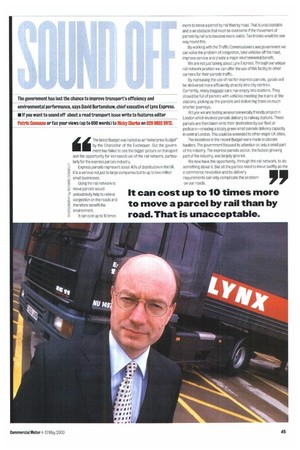S O U
Page 47

If you've noticed an error in this article please click here to report it so we can fix it.
more to move a parcel by rail than by road, That is unacceptable and is an obstacle that must be overcome if the movement of parcels by rail is to become more viable. Tax breaks would be one way round this.
By working with the Traffic Commissioners and government we can solve the problem of congestion, take vehicles off the road, improve service and create a major environmental benefit.
We are not just talking about Lynx Express. Through our unique rail network position we can offer the use of this facility to other carriers for their parcels traffic.
By increasing the use of rail for express parcels, goods will be delivered more efficiently directly into city centres. Currently, many baggage cars run empty into stations. They should be full of parcels with vehicles meeting the trains at the stations, picking up the parcels and delivering them on much shorter journeys.
At Lynx we are testing an environmentally friendly project in London which involves parcels delivery to railway stations. These parcels are then taken on to their destination by our fleet or pedicars—creating a totally green small parcels delivery capacity in central London. This could be extended to other major UK cities.
The incentives in the recent Budget were made to placate hauliers. The government focused its attention on only a small part of the industry. The express parcels sector, the fastest-growing part of the industry, was largely ignored.
We now have the opportunity, through the rail network, to do something about it. But all the parties need to move swiftly as the e-commerce revolution and its delivery requirements can only complicate the problem on our roads.




































































































